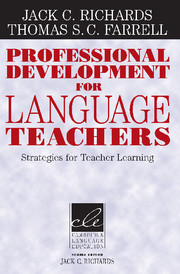Book contents
- Frontmatter
- Contents
- Series editor's preface
- Preface
- 1 The nature of teacher education
- 2 Workshops
- 3 Self-monitoring
- 4 Teacher support groups
- 5 Keeping a teaching journal
- 6 Peer observation
- 7 Teaching portfolios
- 8 Analyzing critical incidents
- 9 Case analysis
- 10 Peer coaching
- 11 Team teaching
- 12 Action research
- Appendix
- Index
1 - The nature of teacher education
Published online by Cambridge University Press: 01 February 2010
- Frontmatter
- Contents
- Series editor's preface
- Preface
- 1 The nature of teacher education
- 2 Workshops
- 3 Self-monitoring
- 4 Teacher support groups
- 5 Keeping a teaching journal
- 6 Peer observation
- 7 Teaching portfolios
- 8 Analyzing critical incidents
- 9 Case analysis
- 10 Peer coaching
- 11 Team teaching
- 12 Action research
- Appendix
- Index
Summary
This book is about how teachers can continue with their professional development as language teachers once their period of formal training is over. It also examines how supervisors and administrators can provide opportunities for such development to take place. The need for ongoing teacher education has been a recurring theme in language teaching circles in recent years and has been given renewed focus as a result of the emergence of teacher-led initiatives such as action research, reflective teaching, and team teaching. Opportunities for in-service training are crucial to the long-term development of teachers aswell as for the long-termsuccess of the programs in which they work. The need for ongoing renewal of professional skills and knowledge is not a reflection of inadequate training but simply a response to the fact that not everything teachers need to know can be provided at preservice level, as well as the fact that the knowledge base of teaching constantly changes. The following vignette is an example that shows the approach a teacher in Korea is taking to manage his own professional development.
Vignette
After teaching in Asia for 2 years without any qualifications and no teaching attributes beyond rough reflection (why didn't that lesson work?), I did the RSA CTEFLA in England (I'm an American). The course was frustrating because so much of what was taught seemed Eurocentric, with little relevance to teaching EFL in Asia. But it gave me tools and reference points for class reflection, and started me off with independent reading. Seven years later, I have begun a master's course in teaching foreign languages. It was the intervening time, however, that provided my principal opportunities for professional development.
- Type
- Chapter
- Information
- Professional Development for Language TeachersStrategies for Teacher Learning, pp. 1 - 22Publisher: Cambridge University PressPrint publication year: 2005



